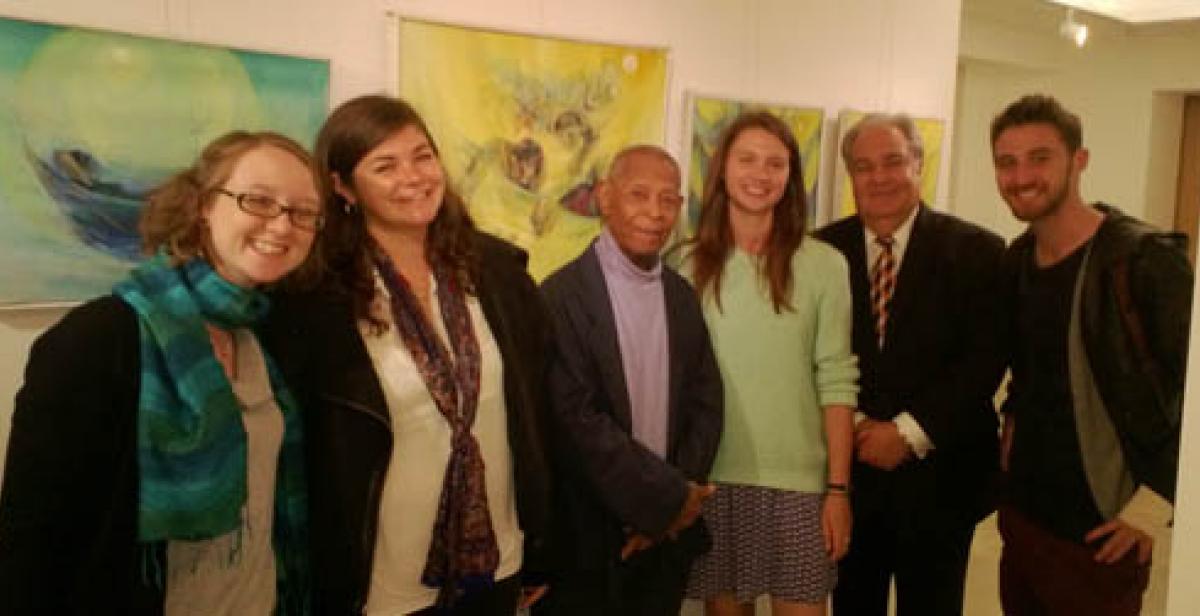(Above, from left to right; ICS Project Officer Ruth Flores, return volunteer Sinead Coulson, renowned artist Miguel Angel Ruiz Matute, return team leader Lucy Usher, Honduran Ambassador Ivan Romero-Martinez and returned volunteer/project administrator Duncan Frankis)
Here at Progressio we believe that the volunteer’s action at home is as significant as the time spent abroad. One of the International Citizen Service’s main aims is to create a global network of active citizens and we believe that it is important volunteers don’t simply treat their placement as a ten week commitment, but rather the beginning of their involvement in this global network. One way in which we do this is to establish and maintain good working relationships with representatives of each one of the countries we work in, who live and work from the UK. We encourage our Nicaragua volunteers (past and present) to work with the various UK branches of the Nicaragua Solidarity Campaign, return African volunteers have recently helped out at the Zimbabwean cultural celebration, ZimFest, and our staff have excellent links within the El Salvadorian embassy. A new venture for us was to meet the Honduran Ambassador, Ivan Romero-Martinez, at the Cervantes Institute of London to meet and discuss Progressio’s work in Honduras, and get the chance to study the work of influential Honduran artist, Miguel Angel Ruiz Matute.
Progressio staff and returned volunteers were greeted by the Ambassador in Matute’s exhibit, and spent some time discussing the various projects that volunteers had been working on in Marcala and La Esperanza (the two southern Honduran towns Progressio works in). Two of the volunteers (Lucy Usher and Sinead Coulson) had returned from Central America less than a week ago, and described their work with Medical brigades, aquaponic systems and gender equality, whilst I was able to discuss the agro-ecology and domestic violence research projects I was a part of earlier this year. Having volunteers from different cycles allowed us to convey our continued work in the areas, our ability to build on previous groups successes and continued interest in Honduras upon return. The Ambassador was very enthusiastic and grateful for Progressio’s work and dedication to the Honduran people’s grievances. He also seemed impressed by the level of Spanish the volunteers had acquired and subsequently extended to us an invitation for future volunteers to meet and discuss project updates with him. His offer to help in any way he could was gratefully accepted, as connections with officials are vitally important to our work and can only help improve efficiency of our programmes with their expertise and local knowledge.
After the more formal discussion about our past work and future goals we were able to enjoy the amazingly eclectic work of the wonderfully enthusiastic artist, who was there in person to explain his paintings. The stark juxtaposition of the Honduran culture was beautifully encompassed in his work; from his sombre take on the chivalry of Don Quixote, to his vivid use of colours in his hammock inspired imagery - taken from his memories of a youth spent on the northern coastlines of Honduras. As he explained the various paintings we were able to share and exchange stories of our experiences, from our mutual love of the coffee grown in Marcala, the delights of the locally produced orange wine and hand crafted Lenca pottery, as well as the mystery that surrounds the Mayan ruins in Copan. It also gave us the chance to talk more frankly about the social and political injustices that still exist in many areas of the country with men who were in a position to give real insight to the situation, especially fascinating was to hear the perspective of a man who grew up in 1930’s Honduras, but had spent the last twenty five years in London. We came away from the exchange feeling as though we had really begun to create solid links with the Honduran embassy, and begin a mutually beneficial partnership that will hopefully continue to flourish to the benefit of Progressio and the communities they work in.



